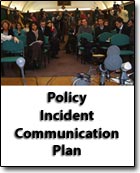Creating a Press Release
 Creating a press release requires thought and preparation, without the core fundamentals your release may end up right in the trash folder of your recipients email. A well-written press release can be an invaluable asset to your company and the success of the content within the release you're trying to help generate attention for. The seven (7) most commonly made mistakes when writing a press release are:
Creating a press release requires thought and preparation, without the core fundamentals your release may end up right in the trash folder of your recipients email. A well-written press release can be an invaluable asset to your company and the success of the content within the release you're trying to help generate attention for. The seven (7) most commonly made mistakes when writing a press release are:
-
Lacking accurate information. Spend the time to review everything that is going into the press release. If anything is incorrect then the entire communication can a will be ignored.
- Assuming anything. Your reader may not know what it is has happened, and since your goal is to have communicate to readers or media outlet, lay out the specifics for them.
- Blaming or talking down to anyone. While number 2 says to be specific with what you are writing, don't write in an accusatory condescending manner. Assume they are not a total idiot.
- Overstating the problem or proposed solution. The purpose of a press release is to put it into the hands of those who have influence and a crowd to share it with.
- Over-writing or bloating the release. A press release is not an article, it's meant to be informative and easily digestible; keep the fluff to a minimum and focus on the details that pertain to issue covered.
- Having a poor subject line. Log into your email and check the messages you have deleted but never opened. Chances are the subject line didn't entice you to open it. Be creative and to the point with the subject line, the difference here can be a success or total failure and most new press release writers skip the importance to this small but invaluable part of content delivery.
- Releasing the Press Release too early or too late. Wait until you have all the facts, specifics and proper information for the contents within, and then send it. Don't send the release announcing a forthcoming release, which will break the trust and relationship with the readers you have. You're better off sitting on a release for a few days then sending it out missing crucial information.






